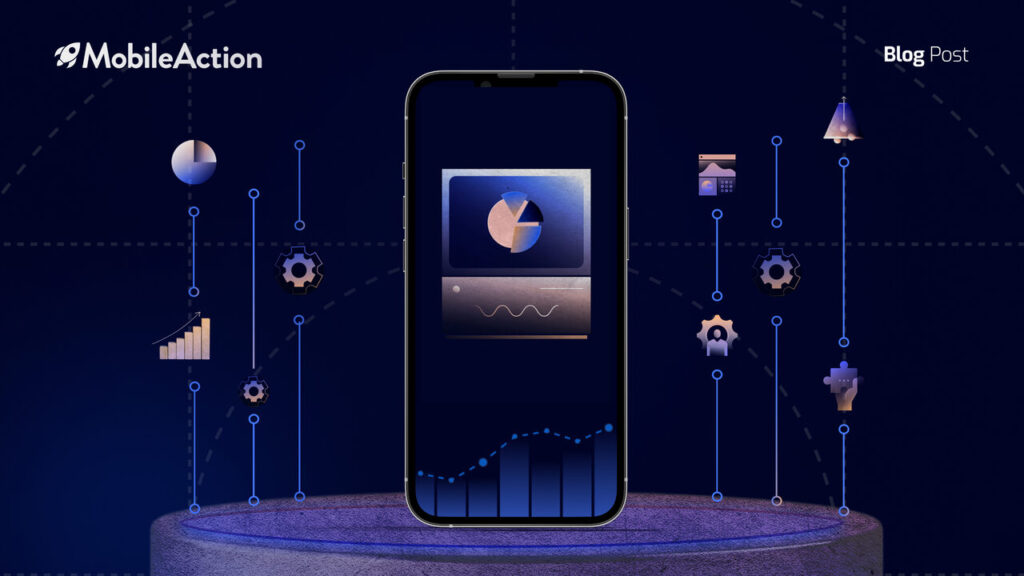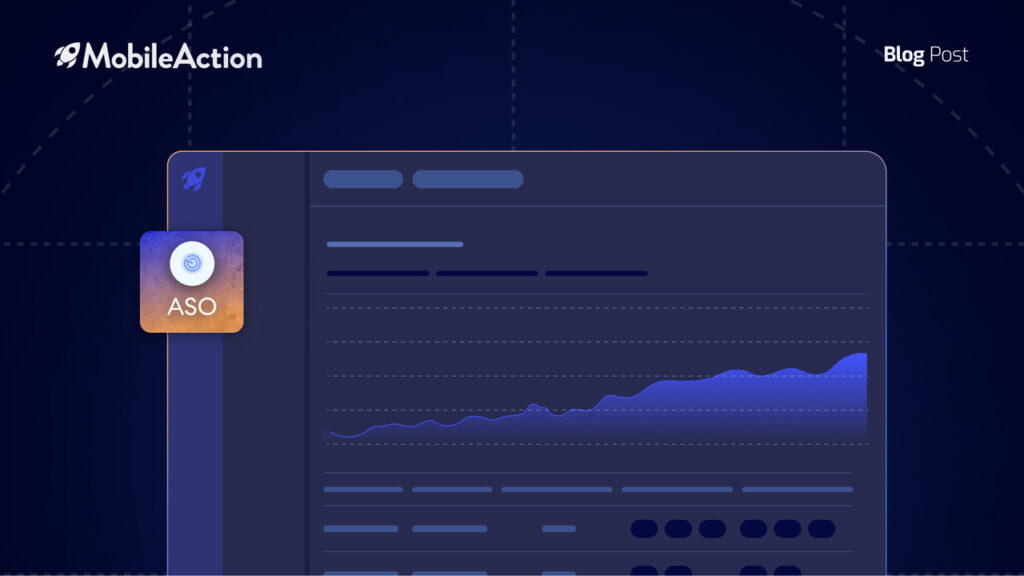With iOS 15, the mobile app world has been introduced to custom product pages. Since then, we’ve been dedicated to maximizing their potential, leveraging every single aspect to transform them into your ultimate game changer. Today, we will explore various potential use cases and examine how apps from different categories leveraged the power of custom product pages. But before we dive in, let’s start at the beginning and briefly discuss what custom product pages entail.
What Are Custom Product Pages?
First and foremost, custom product pages are designed as specific product pages where you craft additional versions of your existing product page. Each of these versions highlights a particular feature or specific content. These pages serve to showcase different aspects or content within your app, catering to distinct audiences. They can also be utilized to display content that aligns with seasons,cultural trends or audience considerations. Each custom product page can feature distinct screenshots, promotional text, and app previews, differing from those on your default product page. It is also important to highlight that they are needed for running Today tab ads on the App Store.
Here are the key advantages of Custom Product Pages:
- Expanded Audience Reach: You’re allowed up to 35 custom product pages per app on the App Store simultaneously. This means you can target 35 distinct audiences concurrently, each with different targeting goals. Alternatively, you can experiment with numerous custom product pages simultaneously to identify the most effective one for your objectives.
- Targeted Keyword Integration: Custom product pages enable you to assign distinct keywords to each page, linking them to specific user groups or features with targeted messaging. This approach enhances conversions with contextual relevance. For example, consider a Health & Fitness app with various meal plans. While some users reach the original prıduct page some others may reach a “keto diet” specific custom product page. This segmentation can significantly boost conversion and download rates.
- Enhanced Marketing Flexibility: Each custom product page comes with its own URL. This enables you to utilize unique URLs for diverse marketing efforts, such as social media ads or promotional communications. (Except as a search results ad that you created with Apple Search Ads)
- Performance Assessment: A valuable aspect is the ability to compare the performance of your custom product pages against your default product page. This analysis helps you determine whether users who download your app from a custom product page exhibit longer engagement or make higher in-app purchases.
- Drive Relevancy: Apple Search Ads presents multiple avenues for utilizing custom product pages. You can craft search results ad variations based on your custom pages, tailoring messaging and visuals for various audiences, feature launches, or seasonal promotions. Alternatively, you can direct users to a specific custom product page when they tap on your ad within the Today tab. This streamlined experience not only boosts conversion rates but also ensures potential customers reach the most relevant page, increasing the likelihood of a successful interaction with your app or product.
- Multi Placement Strategy: Utilizing multiple app placements in Apple Search Ads enhances app visibility and scalability. It broadens your reach, capturing a diverse user base and improving cost-efficiency. This strategic approach often results in reduced CPAs and increased brand recognition, impacting various ad networks. Custom product pages enhance ad relevance, and combining search result ads with the Today tab boosts brand visibility. The Today tab is the default in the App Store, providing high visibility. Running Today tab ads increases familiarity and positively influences downloads. Adding product page ads offers further benefits, allowing you to appear on competitors’ product pages, enhancing user perception and driving downloads.
How and Why Apps from Different Categories Leverage Custom Product Pages
Here, you will find various examples showcasing the use cases of custom product pages from different apps of various categories. They all have unique reasons to leverage custom product pages. We observed apps and their custom product pages strategies and gathered some around to present a set use cases for you. We’ve identified them using our CPP Intelligence tool on MobileAction. We’ve compiled some of the best practices and diverse usage examples to provide you with insights on how to effectively utilize custom product pages and optimize them for the best results.
Bumble
Specific audience targeting
In this example, Bumble, a dating app, aimed to specifically target its lesbian users. Initially, Bumble’s product page didn’t offer anything distinctive for this user group. However, Bumble utilized custom product pages to target lesbian users precisely. A closer examination of the keywords employed makes this intention even more evident, with terms such as “lesbian dating,” “gay,” and “Jack’s,” a dating app made specifically for LGBTQ+.

Source: MobileAction’s dashboard – CPP Intelligence
New Feature
This time, Bumble once again used custom product pages to introduce a new feature. Rather than altering their existing product pages, they simply generated a new one, directing all users searching for “bantr” to this dedicated page. This approach ensures that potential users seeking “bantr” will automatically land on this page, eliminating the need to search for it within the broader Bumble offerings.
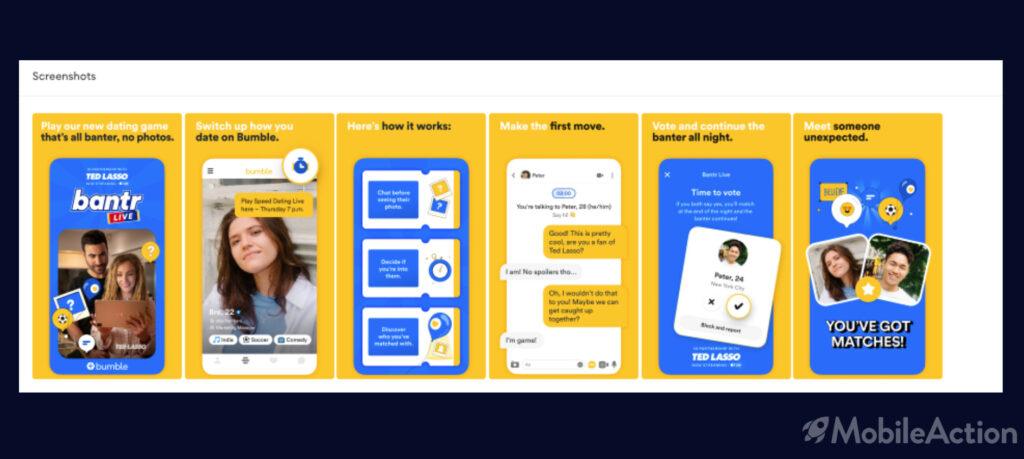
Source: MobileAction’s dashboard – CPP Intelligence
Competitor audience targeting
Once again, Bumble uses custom product pages, and this time, their focus is evidently on targeting Tinder. This becomes quite evident when we examine the keywords present, including variations of “tinder.” Another notable detail is the color scheme. While Bumble typically utilizes yellow in its other custom product pages, this time, they’ve adopted red which we usually associate with Tinder.
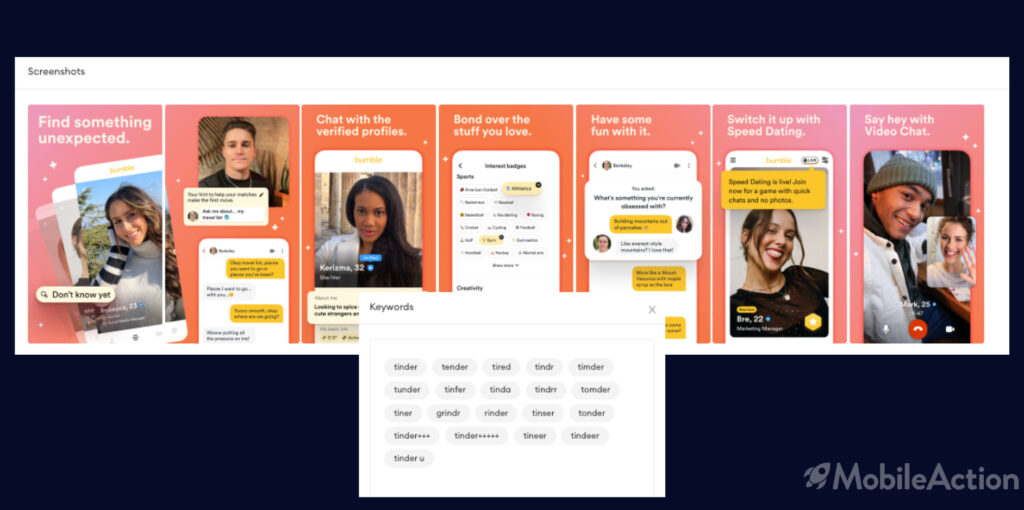
Source: MobileAction’s dashboard – CPP Intelligence
Flo
Side Feature Promotion
This time, let’s take a closer look at Flo. Initially known as a period tracker app, Flo also incorporates a pregnancy tracking feature. Typically, when users search for “period tracking,” they won’t come across this pregnancy tracking functionality on the product pages. To enhance its visibility, custom product pages prove to be the most efficient solution. When users search for keywords related to pregnancy tracking, they will be directed to this specific page instead of the original Flo product page, which solely focuses on period tracking features.
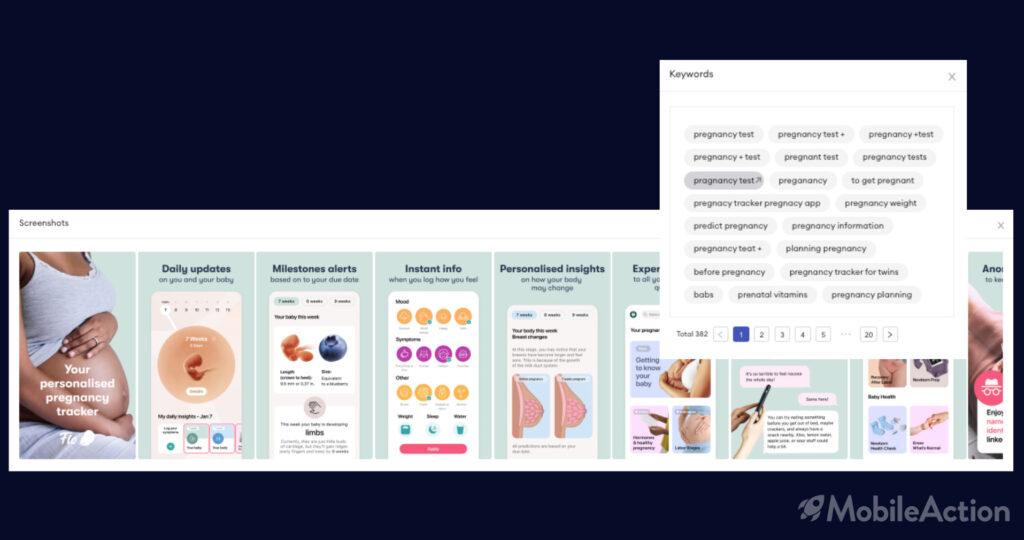
Source: MobileAction’s dashboard – CPP Intelligence
Expedia
Feature specialization
Let’s take a closer look at Expedia’s custom product pages strategy. Expedia, a travel app, boasts a diverse array of features, including hotel booking, car rentals, and flight ticket bookings. A typical search for “Expedia” would yield a product page encompassing all these features simultaneously. To enhance specificity and avoid this broad display, Expedia has ingeniously crafted distinct product pages, each tailored to a specific feature with its corresponding set of keywords. Consequently, your search results for “flight tickets” and “hotel booking” will lead you to distinct product pages. This approach empowers Expedia to present detailed information about each feature to users who are actively searching for those specific terms.

Source: MobileAction’s dashboard – CPP Intelligence
Specific Audience Targeting
Here we have another excellent example of custom product pages. As we’re aware, there’s a substantial Spanish-speaking population in the United States. Expedia has taken note of this and developed an entirely Spanish product page with corresponding Spanish keywords to cater to Spanish speakers. This way they can also convert Spanish-speaking audiences too.
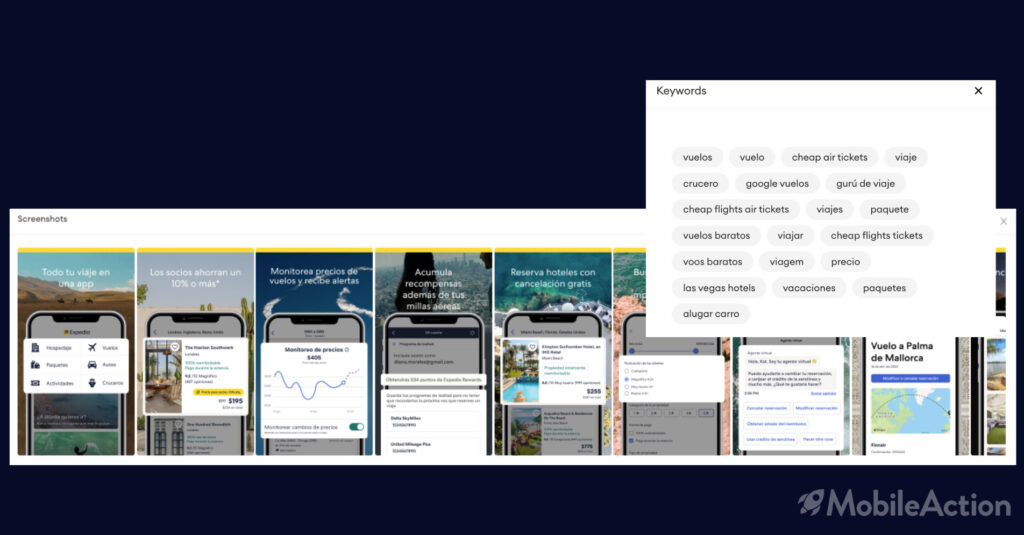
Source: MobileAction’s dashboard – CPP Intelligence
Lifesum
Side Feature Promotion
Lifesum is a Health & Fitness app that provides calorie and habit tracking and offers you diet and meal plan ideas. But probably, Keto is one of the most popular diet types so Lifesum created a custom product page just to attract the ones who specifically search for Keto. While we look at the product page below, it looks like a whole Keto dedicated app which probably has a higher conversion rate for the ones who search the word “keto”.

Source: MobileAction’s dashboard – CPP Intelligence
Gopuff
Feature Specialization
Gopuff showcases some compelling use cases as well. They’ve established distinct custom product pages for alcohol-related orders and grocery-related orders. A glance at their keywords reveals a distinct separation between the two. When you search for “beer,” you’ll encounter an entirely different product page compared to searching for “groceries.” This approach enables Gopuff to effectively cater to both audiences and drive conversions.
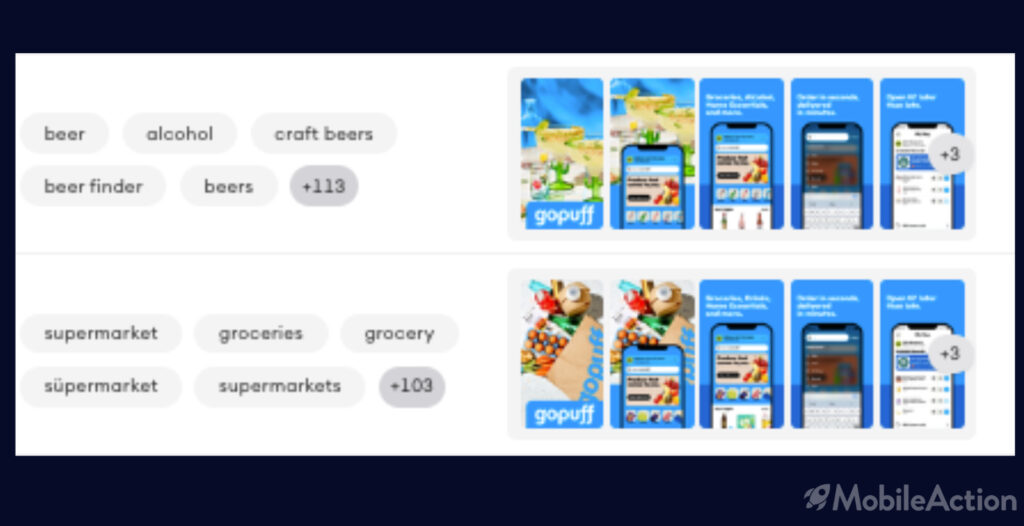
Source: MobileAction’s dashboard – CPP Intelligence
Meditopia
Side Feature Promotion
Following a strategy similar to Gopuff, Meditopia has also implemented a dedicated product page for its sleeping feature. Given that Meditopia is primarily a meditation app, this approach serves as an effective means to highlight their additional offering of sleep-related assistance alongside their meditation-focused content. Looking at the colors and background images, dark purple, moon, clouds, and stars make us think of the night at sleep, which is also another tip that we can get from these examples.

Source: MobileAction’s dashboard – CPP Intelligence
Amazon
Competitor audience targeting
Turning our attention to Amazon, we encounter a distinct example of competitor targeting. Amazon, a comprehensive shopping app not exclusively tailored to kids, has crafted custom product pages specifically aimed at the children’s segment. An examination of their keywords reveals a clear targeting of Carter’s users, which, once again, is a store specializing in children’s merchandise.

Source: MobileAction’s dashboard – CPP Intelligence
Gold Fish Slots
Specialization in Category
Here we have an app from the Games category, specifically a casino app. To address this particular niche, Gold Fish Slots has employed a custom product page since there isn’t a designated “casino” category. This move allows them to precisely define their game. Also vertical designs, instead of horizontal designs, are very much preferred compared to other categories.
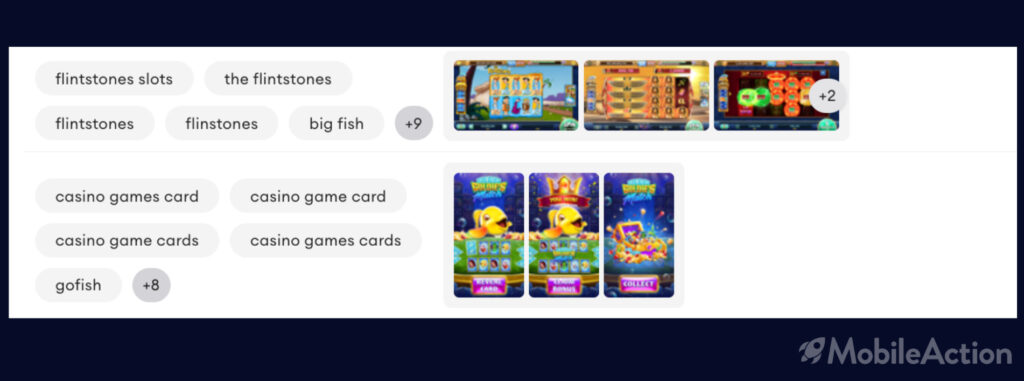
Source: MobileAction’s dashboard – CPP Intelligence
Key Takeaways
Possible Use Cases of Custom Product Pages:
- Feature Highlighting: Showcase specific features or content within your app that cater to distinct user groups.
- Targeted Campaigns: Craft tailored pages for different marketing campaigns or promotions to optimize user engagement.
- Seasonal Offerings: Create pages that align with seasonal trends, holidays, or cultural events to maximize relevance.
- Market Segmentation: Develop Custom Product Pages targeting different audience segments, languages, or regions.
- Competitor Targeting: Direct users searching for competitor apps to dedicated pages highlighting your app’s advantages.
Key Benefits of Custom Product Pages:
- Precise Targeting: Reach specific audiences with content tailored to their needs and preferences.
- Enhanced Conversion Rates: Improve the likelihood of conversions by providing relevant information upfront.
- Optimized User Experience: Offer a personalized experience that resonates with users and addresses their interests.
- Expanded Visibility: Boost app visibility for niche searches, ensuring your app appears prominently.
- Improved Analytics: Gain insights into which custom product pages perform best and resonate with certain user groups.
- Flexible Marketing: Create unique URLs for different marketing efforts, allowing for better tracking and customization.
- Today Tab Enablement: Custom product pages are needed if you want to run Today tab ads on the App Store. Running ads on the Today tab increases your brand’s visibility and familiarity among users, which can positively influence their decision to download your app when they see it in the search results.
- Custom product pages for ad variations, in conjunction with Today tab and product page ads, boost ad relevance, brand visibility, and user decisions to download while providing deeper insights into your app’s offerings
Custom product pages are a powerful tool for mobile app advertisers to drive conversions and revenue. By showcasing a specific product or service, custom product pages can help advertisers stand out and personalize their message to their target audience.
Remember, a clear and compelling message, paired with a visually pleasing design, and a clear call-to-action are key elements of a successful custom product page. Keep these in mind as you work to optimize your own custom product pages and drive results for your mobile app advertising campaigns.
We’ve explored some of the use cases and strategies of custom product pages. By using the custom product pages Intelligence tool through MobileAction, you can implement these strategies for your app.
As an advertiser, you can improve the performance of your custom product pages and increase conversions and revenue. All you need to do is to try Custom Product Pages Intelligence today. You can also schedule a demo with our experts let them guide you throughout the process and discover all your potential.


